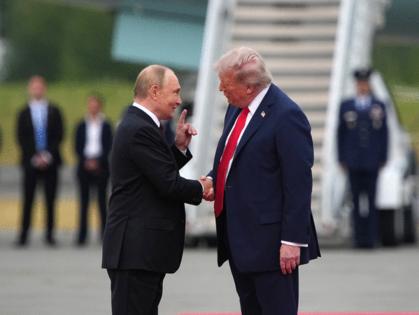US urges G-7 sanctions on Russia oil as Trump loses patience
Published in News & Features
The U.S. will urge its allies in the Group of Seven to impose tariffs as high as 100% on China and India for their purchases of Russian oil in an effort to convince President Vladimir Putin to end his war in Ukraine.
President Donald Trump said on Friday that his patience with Putin was “running out fast” and threatened new economic sanctions. “It’ll be hitting very hard on with sanctions to banks and having to do with oil and tariffs also,” he said in an interview on Fox News.
The U.S. will also tell the G-7 countries they should create a legal pathway to seize immobilized sovereign Russian assets and consider seizing or using the principle of those assets to fund Ukraine’s defense, according to a U.S. proposal seen by Bloomberg. The vast majority of the about $300 billion of Moscow’s immobilized assets are in Europe.
Brent crude futures extended gains following the report, briefly touching a session high, and closed up 0.8%. The euro fell to the day’s low, while trading little changed late in the New York session Friday, at around the $1.1734.
A spokesperson from the White House didn’t immediately respond to a request for comment on the proposals.
Separately, senior U.S. officials have floated with European counterparts the idea of gradually seizing those frozen Russia assets to increase the pressure on Moscow to enter into negotiations, according to people familiar with the matter who spoke on the condition of anonymity.
Profits generated by the assets are currently being used to provide loans to Ukraine.
Canada, which holds the presidency of the G-7, convened a meeting of the group’s finance ministers on Friday to “discuss further measures to increase pressure on Russia and limit their war machinery,” according to a statement.
Treasury Secretary Scott Bessent, in that “emergency” G-7 discussion, reiterated Trump’s call to the group that “if they are truly committed to ending the war in Ukraine, they should join the United States in imposing tariffs on countries purchasing oil from Russia,” according to a statement from the Treasury.
Bessent and U.S. Trade Representative Jamieson Greer welcomed commitments to “explore using immobilized Russian sovereign assets to further benefit Ukraine’s defense,” the U.S. Treasury statement also said.
The U.S. proposal calls for 50% to 100% secondary tariffs on China and India as well as restrictive trade measures on both imports and exports to curb the flow of Russian energy and to prevent the transfer of dual-use technologies into Russia, according to the proposal.
The proposal poses a challenge given that several nations in the EU, including Hungary, have blocked more stringent sanctions targeting Russia’s energy sector. Such measures would require the backing of all member states.
Trump has told European officials he’s willing to impose sweeping new tariffs on India and China to push Putin to the negotiating table with Ukraine — but only if nations in Europe do so as well.
Trump made the ask when he called into a meeting with senior U.S. and European Union officials in Washington this week and said the U.S. would be willing to mirror tariffs imposed by Europe on either country, Bloomberg reported earlier.
Trump’s suggestion comes after his deadline for Putin to hold a bilateral meeting with Ukraine’s Volodymyr Zelenskyy passed without indication that the Russian leader was genuinely interested in engaging in face-to-face peace talks. Instead, Moscow has stepped up its Ukraine bombing campaign.
Russia on Friday said negotiations with Ukraine were on “pause” despite Trump’s push following a meeting with Putin last month for direct talks between the Russian leader and Zelenskyy.
The proposal to the G-7 also seeks sanctions targeting Russia’s so-called shadow fleet of oil tankers and the networks that enable the trades to flow; the Russian oil company Rosneft PJSC; and a prohibition of insurance for maritime services.
The U.S. will also call on its allies to sanction entities supporting Russia’s military industry; Russian regional banks; prohibit services related to artificial intelligence and financial technology in Russian Special Economic Zones, according to the proposals.
Trump has so far refrained from imposing direct sanctions on Russia, despite skating through several self-imposed deadlines and Putin’s continued reluctance to negotiate an end to the war. Trump has, however, doubled tariffs on India to 50% over its continued purchase of Russian oil.
The G-7 discussions come as the EU is working on a 19th package of sanctions, which is expected to target more Russian banks and the country’s oil trade, Bloomberg previously reported.
(Josh Wingrove, Laura Dhillon Kane, Alex Longley and Hadriana Lowenkron contributed to this report.)
©2025 Bloomberg L.P. Visit bloomberg.com. Distributed by Tribune Content Agency, LLC.







Comments